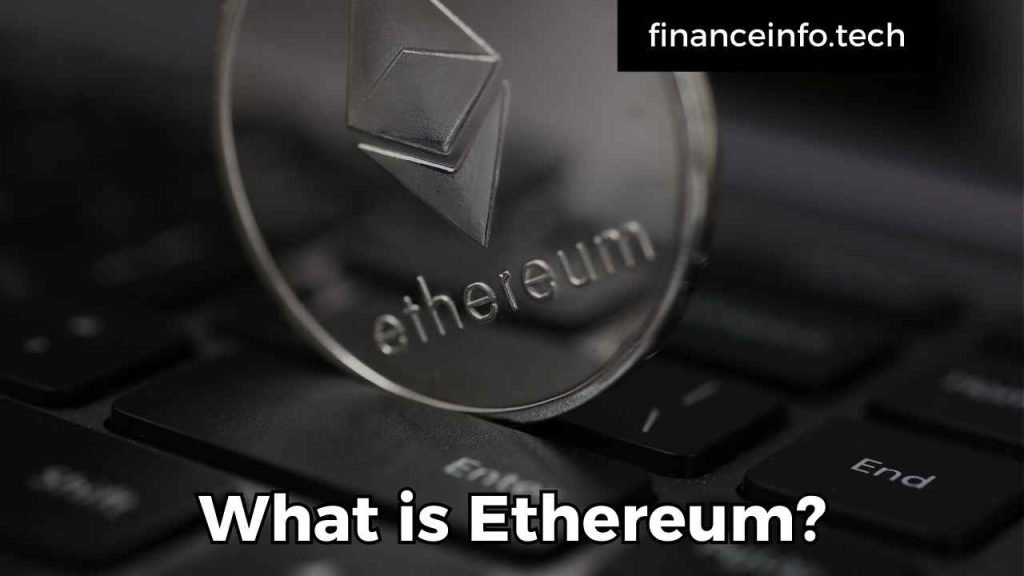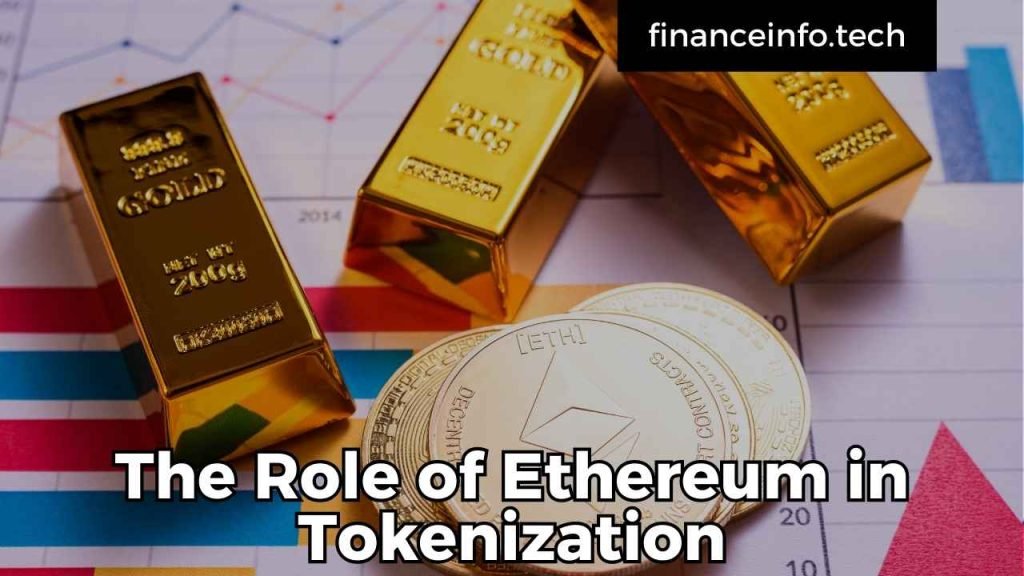Table of Contents
Introduction
In latest years, the intersection of finance and generation has brought about groundbreaking innovations. One of the maximum compelling developments on this area is Ethereum, a decentralized platform that has captured the attention of each traders and technologists. In this submit, we will delve into “Fintech Zoom Ethereum,” exploring its significance, capability, and how it is shaping the future of finance.

What is Ethereum?
Ethereum is greater than just a cryptocurrency; it is a blockchain platform that enables builders to build decentralized programs (dApps). Unlike Bitcoin, which broadly speaking serves as a digital foreign money, Ethereum’s versatility permits it to strength clever contracts, facilitating complicated transactions without intermediaries. By leveraging blockchain era, Ethereum aims to revolutionize diverse sectors, making processes extra efficient and transparent.
To fully appreciate Ethereum, it’s vital to understand its underlying generation. At its middle, Ethereum makes use of a decentralized community of computer systems that work collectively to validate and report transactions. This community operates on a consensus mechanism known as proof of stake, that is extra power-efficient than traditional evidence of labor systems. As a result, Ethereum stands as a testomony to how fintech can sell sustainability even as advancing technological progress.
The Rise of Fintech Zoom
Fintech Zoom refers to the rapid development of economic technology, a quarter that is evolving at an unparalleled pace. The emergence of cryptocurrencies, blockchain technology, and decentralized finance (DeFi) has shifted how we perceive and interact with money. In this context, Ethereum plays a essential position, serving as a basis for lots of these improvements.
The term “Fintech Zoom” encompasses various traits, from cellular banking to robo-advisors, all designed to enhance consumer revel in and accessibility. As traditional economic institutions grapple with the upward thrust of fintech, many are starting to adapt and innovate to stay competitive. This shift has led to multiplied investment in technology, mainly in regions like Ethereum, which enables new enterprise fashions and operational efficiencies.
Understanding Smart Contracts
One of the standout capabilities of Ethereum is its assist for smart contracts. These self-executing contracts automate transactions when predefined situations are met. This generation now not best streamlines approaches but also reduces the chance of disputes, as the phrases are recorded at the blockchain.
Imagine a state of affairs where you need to hire an condominium. Traditionally, this will involve lower back-and-forth verbal exchange with landlords and a hefty quantity of paperwork. With a smart agreement, the whole system can be computerized. You may want to ship the agreed condo charge, and as soon as showed, the clever settlement could supply you access to the apartment, all without any human intervention. This illustrates how Ethereum can simplify everyday transactions even as offering a higher degree of accept as true with.
Decentralized Finance (DeFi) and Ethereum
Decentralized Finance, or DeFi, is a motion that objectives to recreate traditional monetary systems using blockchain generation. Ethereum is at the leading edge of this revolution, providing the infrastructure for various DeFi applications. From lending systems to decentralized exchanges, Ethereum permits users to get entry to economic services with out intermediaries.
DeFi has received giant popularity because of its promise of democratizing finance. It allows absolutely everyone with an internet connection to participate in economic activities, no matter their location or socioeconomic fame. This inclusivity is particularly tremendous in underbanked areas, wherein access to conventional banking offerings is restrained.
Moreover, DeFi structures frequently provide better interest costs on financial savings and decrease fees on transactions in comparison to standard monetary establishments. As a end result, many individuals are turning to Ethereum-based DeFi answers for his or her monetary desires, highlighting the platform’s developing significance inside the fintech landscape.

The Role of Ethereum in Tokenization
Tokenization refers back to the technique of changing bodily or virtual assets into tokens on a blockchain. Ethereum facilitates this with the aid of allowing developers to create tokens the use of its ERC-20 trendy. These tokens can constitute numerous property, consisting of actual estate, art, or maybe shares, making them easily tradable at the blockchain.
Tokenization gives severa blessings, such as multiplied liquidity, fractional ownership, and improved safety. For instance, actual property traders should buy fractions of homes thru tokenization, lowering the barrier to entry for many. This democratization of investment opportunities illustrates how Ethereum can reshape traditional markets, making them more on hand and efficient.
NFTs and the Ethereum Ecosystem
Non-fungible tokens (NFTs) have taken the arena through hurricane, and Ethereum is the driving pressure at the back of this fashion. NFTs are precise digital assets that constitute ownership of a selected object or piece of content, consisting of artwork or music. The potential to create, purchase, and promote NFTs on Ethereum’s blockchain has unfolded new avenues for artists and creators.
The rise of NFTs has sparked discussions about possession, cost, and authenticity inside the virtual age. Artists can now promote their paintings at once to creditors, bypassing conventional gatekeepers. This shift empowers creators, allowing them to hold a larger share of their income at the same time as enticing with their target market in novel methods.
Furthermore, NFTs have the capability to revolutionize numerous industries, from gaming to fashion. As more companies discover the possibilities of NFTs, Ethereum’s role because the main platform for digital assets is cemented.
Challenges Facing Ethereum
Despite its many benefits, Ethereum isn’t without its challenges. One giant trouble is scalability. As more customers and programs flock to the platform, the network can grow to be congested, main to slower transaction instances and better expenses. This congestion can deter new users and preclude the boom of dApps.
To cope with scalability concerns, Ethereum developers are running on a sequence of improvements, together called Ethereum 2.Zero. This transition includes transferring from a proof-of-paintings to a proof-of-stake consensus mechanism, drastically growing the community’s potential. While these upgrades promise to enhance Ethereum’s performance, they require careful implementation to make certain a smooth transition.
The Future of Ethereum and Fintech Zoom
As we appearance beforehand, the future of Ethereum inside the fintech landscape appears promising. With ongoing developments in DeFi, NFTs, and tokenization, Ethereum is well-located to grow to be a cornerstone of the subsequent technology of monetary offerings. The flexibility and functionality of the platform permit developers to create progressive solutions that cater to evolving consumer needs.
Moreover, the growing hobby in cryptocurrencies and blockchain technology is using institutional investment in Ethereum. As more companies recognize the capacity of decentralized finance, we will expect to see accelerated collaboration among conventional economic institutions and blockchain innovators. This synergy should result in more included solutions that leverage the quality of each worlds.

Navigating the Regulatory Landscape
As Ethereum and the wider fintech region hold to conform, navigating the regulatory panorama becomes essential. Governments and regulatory our bodies are grappling with a way to approach cryptocurrencies and blockchain generation. While some nations embrace these improvements, others impose strict guidelines or outright bans.
Finding a balance among fostering innovation and defensive consumers is critical for the sustainable growth of Ethereum. As regulatory clarity emerges, companies will be higher positioned to operate within installed frameworks, decreasing uncertainty and encouraging in addition funding.
The Importance of Community in Ethereum
Ethereum’s achievement is not entirely due to its era; the community at the back of it plays a crucial position. Developers, investors, and lovers collaborate to boost the platform, percentage understanding, and aid each other. This sturdy sense of network fosters innovation, as people are recommended to make a contribution their ideas and abilties.
Moreover, network involvement ensures that Ethereum remains conscious of person wishes. Feedback from users can lead to enhancements within the platform, helping it adapt to the ever-converting landscape of fintech. This collaborative spirit is a testament to the electricity of decentralization and the potential for collective boom.
Ethereum vs. Other Cryptocurrencies
While Ethereum stands out as a main blockchain platform, it is important to take into account how it compares to other cryptocurrencies. Bitcoin, for instance, on the whole functions as a virtual currency, whilst Ethereum gives a greater massive variety of applications via clever contracts and dApps. This versatility gives Ethereum a unique role in the crypto environment.
Other blockchain systems, consisting of Cardano and Solana, are also vying for a share of the marketplace. Each offers distinct features and blessings, making the competition in the space fierce. However, Ethereum’s hooked up community, developer network, and ongoing upgrades position it favorably for continued boom.
How to Get Started with Ethereum
If you are interested by exploring Ethereum, getting started is fairly trustworthy. First, you’ll want to create a digital wallet to save your Ether (ETH), the local cryptocurrency of the Ethereum community. Various wallet alternatives are to be had, such as software wallets, hardware wallets, and cell apps.
Once your wallet is set up, you should purchase ETH from numerous exchanges. This cryptocurrency may be used for trading, making an investment, or collaborating in decentralized packages. As you end up more acquainted with Ethereum, you can explore opportunities in DeFi, NFTs, or tokenization, each providing particular reports and ability rewards.

Investing in Ethereum
Investing in Ethereum may be thrilling, but it’s vital to approach it with warning. Like any investment, the price of ETH may be risky, inspired by way of market trends, technological advancements, and regulatory developments. Therefore, it’s critical to behavior thorough studies and recollect your danger tolerance before making an investment.
Diversification is also key to dealing with threat to your investment portfolio. Instead of placing all your finances into Ethereum, take into account allocating a element to other cryptocurrencies or traditional assets. This method can assist mitigate capacity losses and provide a greater balanced investment approach.
Also Read: The Thruster Finance Experience 2024
Conclusion:
In end, “Fintech Zoom Ethereum” represents a transformative pressure inside the economic landscape. With its revolutionary generation, growing community, and potential for extensive adoption, Ethereum is ready to play a pivotal function in shaping the destiny of finance. As we navigate this interesting adventure, it’s vital to live knowledgeable and engaged, embracing the possibilities that lie ahead.
FAQ About Fintech Zoom Ethereum
Q1: What are Ethereum smart contracts?
Ans: Ethereum smart contracts are self-executing contracts with the terms of the agreement directly written into code. They automatically enforce and execute actions based on predetermined conditions, eliminating the need for intermediaries. This automation increases efficiency and reduces the risk of fraud.
Q2: Which companies use the Ethereum platform?
Ans: Many prominent companies utilize the Ethereum platform, including Microsoft, IBM, and JPMorgan Chase. These organizations leverage Ethereum’s blockchain technology for various applications, such as supply chain management, financial services, and decentralized finance (DeFi). Its flexibility allows businesses to innovate and streamline processes.
Q3: What are the applications built on the Ethereum blockchain commonly called?
Ans: Applications built on the Ethereum blockchain are commonly referred to as decentralized applications (dApps). These dApps operate on a peer-to-peer network and are designed to provide services without central authority, ensuring transparency and security. They encompass a wide range of functionalities, from finance to gaming.
Q4: What is Ethereum used for?
Ans: Ethereum is primarily used for creating and executing smart contracts and decentralized applications. Its blockchain facilitates a variety of use cases, including token creation, digital asset management, and decentralized finance (DeFi) solutions. This versatility makes Ethereum a leading platform in the blockchain ecosystem.
Q5: How does the Ethereum blockchain work?
Ans: The Ethereum blockchain functions as a distributed ledger that records all transactions and smart contracts in a secure and transparent manner. It utilizes a consensus mechanism known as Proof of Stake (PoS) to validate and confirm transactions. This decentralized approach enhances security and prevents tampering.
Q6: Is Ethereum decentralized?
Ans: Yes, Ethereum is a decentralized platform, meaning it operates without a central authority. Its network comprises numerous nodes that validate and process transactions collaboratively, ensuring transparency and resilience against censorship. This decentralization is a core principle of blockchain technology.
Q7: How was Ethereum created?
Ans: Ethereum was created by a team led by Vitalik Buterin in 2015, following a successful crowdfunding campaign. The platform was designed to expand the use of blockchain technology beyond cryptocurrency, enabling developers to build decentralized applications and smart contracts. Its launch marked a significant evolution in the blockchain landscape.
Q8: Why does Ethereum have value?
Ans: Ethereum has value primarily due to its utility and demand within the blockchain ecosystem. As the foundation for many decentralized applications and services, it facilitates various transactions and smart contracts, driving its adoption. Additionally, factors like scarcity, community support, and ongoing development contribute to its market value.

Leave a Reply